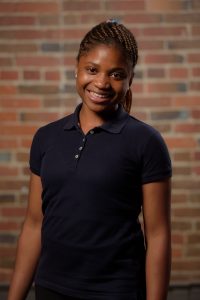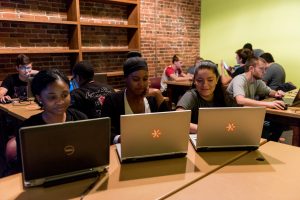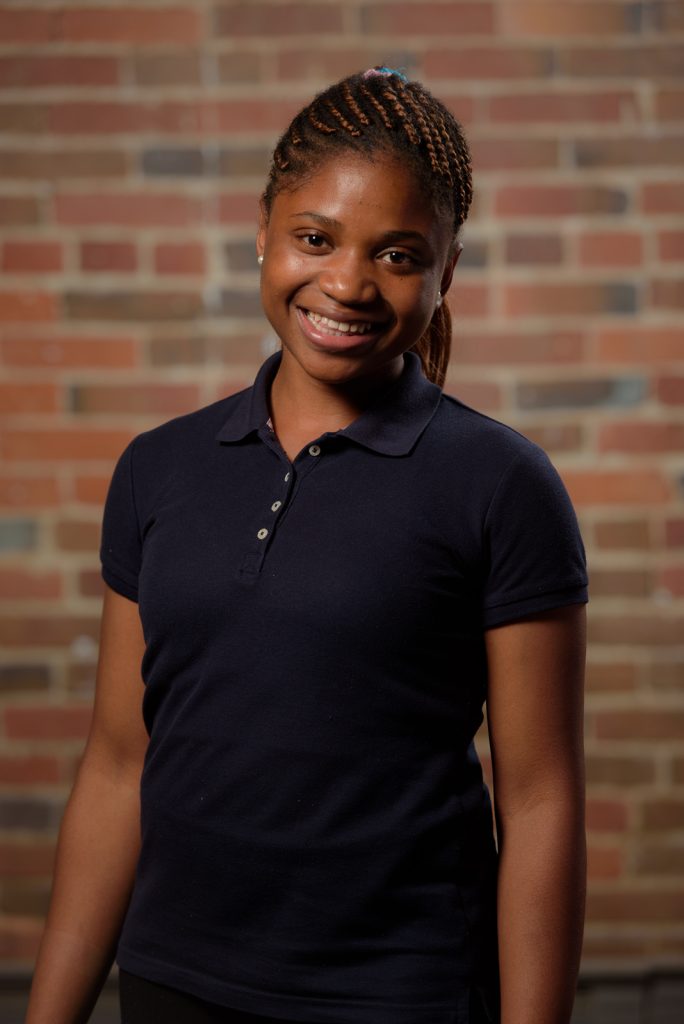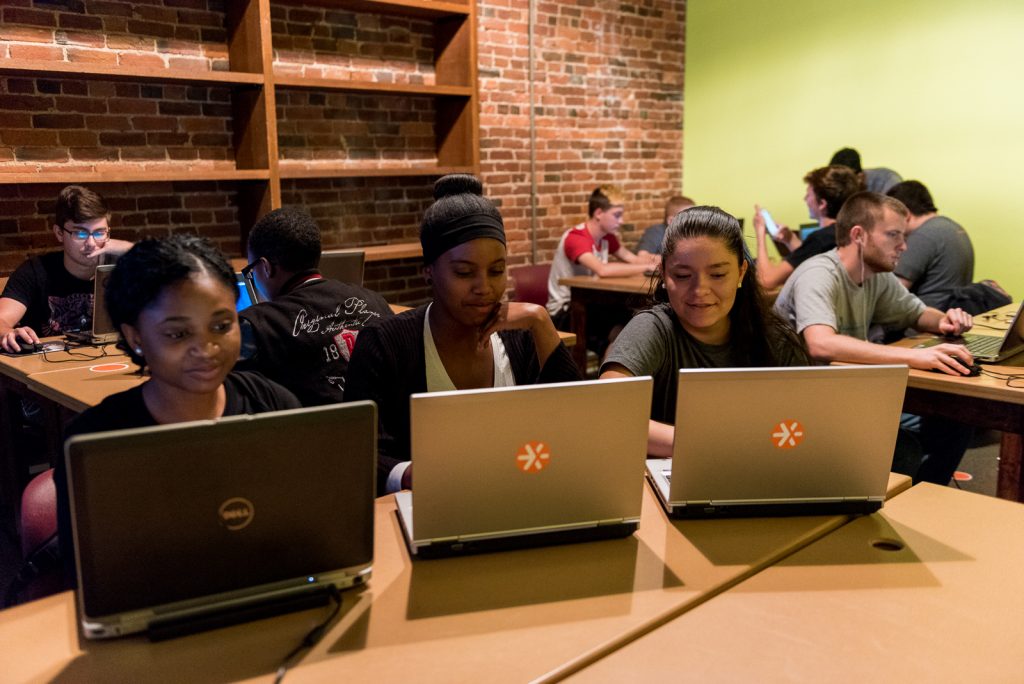Impact Stories: Patience
Catapult brings girl’s simmering interest in tech to full boil

You might think it’s impossible for a girl to grow up in the technology capital of Africa, move to an American city with dramatic growth in tech jobs, be more fascinated by how a TV remote control works than the channels she can watch and want some sort of career in technology – yet never be encouraged to take a computer science class.
But it’s not impossible at all. Meet Patience Korrie, who says, “I had always been interested in tech but never had the opportunity to enter into that world until Nextech. How does someone like me, with no one to relate to, figure out if tech is really for me?”
Lack of encouragement leaves girls out of STEM. Now 22, Patience and her father were the first of her family to move here from Lagos, Nigeria, when she was 11. Though Lagos has become an international educational and cultural center, its school systems weren’t technologically advanced a decade ago.
“Like most kids, when I was growing up I spent most of my time outside and doing chores around the house. Kids my age didn’t really get the opportunity to get into tech. Classrooms and normal households in Lagos didn’t have computers,” she said.
When she arrived in the U.S., the school system recommended that this young Black girl repeat the fifth grade, even though (British) English was her first language and her grades were good. It was a decision her parents regretted and did not allow to be repeated when her brother Daniel came over.
Regardless of any lack of opportunity, Patience’s interest in technology started early.
“I always thought technology was really cool. Like having the power to change a TV channel from the couch. As a kid in Lagos, you don’t get to go near radios or TVs – you hear and watch what your parents listen to and watch – so when I came here and had the remote control in my hand, I was like, ‘Oh my goodness, how does this even work?’ There was so much to explore! My mind was blown.”
It wasn’t long before she’d decided she wanted to work in technology as an adult. But though she was the oldest, Patience wasn’t the first in her family to enroll in tech-related high school classes.
“My tech interest rubbed off on my brother Daniel, and he was encouraged to take computer classes, but I wasn’t,” she said. “Society sees technology as something that men do, like it’s a hard and complicated career path that only rare people go through, and those people are male.”
Daniel told her about his computer classes and Nextech’s Catapult program.
“He said Catapult sounded really cool and thought I’d like it,” she said. “The more I heard about it from him and other students, the more I wanted to do it. So I applied with a (girl) friend, and we both got in.”
BIPOC females don’t see themselves reflected in tech. They were two of three females in that summer’s Catapult class.
 “We learned how to code and build online portfolios that showcase the experiences you have. By the end of the program, you’ve also visited a lot of different companies and gotten the opportunity to see what they do. You see the different areas in computer science and that it’s not just about coding, but also design and how technology is integrated in so many other careers, like medicine or music. It was amazing,” she said.
“We learned how to code and build online portfolios that showcase the experiences you have. By the end of the program, you’ve also visited a lot of different companies and gotten the opportunity to see what they do. You see the different areas in computer science and that it’s not just about coding, but also design and how technology is integrated in so many other careers, like medicine or music. It was amazing,” she said.
Addressing such questions in Catapult sealed the deal. There’d be no question that Patience would pursue a tech degree in college.
“We got to meet very cool people, like the CEO of Nextech, who is a woman. And we had mentors who introduced us to where they work and mentors who were college students as well. I’ve gotten a lot of connections who helped me realize I do like computer science and I could pursue this or that job with it.”
Her Catapult class included students like her who had no tech experience to students who knew a lot about it. She believes students need to see people like themselves among their teachers.
“Computer science was hard to understand and do, but my interest and curiosity in tech was so big that I stuck with it,” she said. “But not having anyone like me to relate to causes a lot of doubts. And the way things are structured in our educational system, before you know it you end up taking way more classes than you need to as you figure out what you want to do.”
She said schools need to start encouraging girls’ interest in technology while they’re in middle school.
“The way to attract women to tech is to start sneaking in the idea in middle school, having conversations about whatever is going on in their lives. So, you can change this channel with the remote – why is that? How does having that power make you feel? What could happen if someone else had that power? Those types of questions would lead to computer science and tech.”
Catapult helped Patience figure out her future. This May, she will graduate from Taylor University after receiving a full scholarship with a degree in digital media systems.
“The degree leaves a huge field for me to choose from. I could go into web design, web development, business management, photography … I want to stay in Indianapolis, and I have several things lined up as possibilities,” she said. “It’s been quite a ride!”
Whatever she does will include giving back.
“I’d like to own my own company one day, and I have a journal of ideas I’d like my company to do. A lot of young people are still in the imaginative stage and still growing, then once they get to their senior year in college, they start to think things aren’t possible. I want to develop an environment where they can have real-life experiences to explore. Real opportunities, real experiences and connections. Also, if you have a great idea for an investment, I want to have a company that enables you to pursue that dream. Those are the building blocks to success.”

You might think it’s impossible for a girl to grow up in the technology capital of Africa, move to an American city with dramatic growth in tech jobs, be more fascinated by how a TV remote control works than the channels she can watch and want some sort of career in technology – yet never be encouraged to take a computer science class.
But it’s not impossible at all. Meet Patience Korrie, who says, “I had always been interested in tech but never had the opportunity to enter into that world until Nextech. How does someone like me, with no one to relate to, figure out if tech is really for me?”
Lack of encouragement leaves girls out of STEM. Now 22, Patience and her father were the first of her family to move here from Lagos, Nigeria, when she was 11. Though Lagos has become an international educational and cultural center, its school systems weren’t technologically advanced a decade ago.
“Like most kids, when I was growing up I spent most of my time outside and doing chores around the house. Kids my age didn’t really get the opportunity to get into tech. Classrooms and normal households in Lagos didn’t have computers,” she said.
When she arrived in the U.S., the school system recommended that this young Black girl repeat the fifth grade, even though (British) English was her first language and her grades were good. It was a decision her parents regretted and did not allow to be repeated when her brother Daniel came over.
Regardless of any lack of opportunity, Patience’s interest in technology started early.
“I always thought technology was really cool. Like having the power to change a TV channel from the couch. As a kid in Lagos, you don’t get to go near radios or TVs – you hear and watch what your parents listen to and watch – so when I came here and had the remote control in my hand, I was like, ‘Oh my goodness, how does this even work?’ There was so much to explore! My mind was blown.”
It wasn’t long before she’d decided she wanted to work in technology as an adult. But though she was the oldest, Patience wasn’t the first in her family to enroll in tech-related high school classes.
“My tech interest rubbed off on my brother Daniel, and he was encouraged to take computer classes, but I wasn’t,” she said. “Society sees technology as something that men do, like it’s a hard and complicated career path that only rare people go through, and those people are male.”
Daniel told her about his computer classes and Nextech’s Catapult program.
“He said Catapult sounded really cool and thought I’d like it,” she said. “The more I heard about it from him and other students, the more I wanted to do it. So I applied with a (girl) friend, and we both got in.”
BIPOC females don’t see themselves reflected in tech. They were two of three females in that summer’s Catapult class.

“We learned how to code and build online portfolios that showcase the experiences you have. By the end of the program, you’ve also visited a lot of different companies and gotten the opportunity to see what they do. You see the different areas in computer science and that it’s not just about coding, but also design and how technology is integrated in so many other careers, like medicine or music. It was amazing,” she said.
Addressing such questions in Catapult sealed the deal. There’d be no question that Patience would pursue a tech degree in college.
“We got to meet very cool people, like the CEO of Nextech, who is a woman. And we had mentors who introduced us to where they work and mentors who were college students as well. I’ve gotten a lot of connections who helped me realize I do like computer science and I could pursue this or that job with it.”
Her Catapult class included students like her who had no tech experience to students who knew a lot about it. She believes students need to see people like themselves among their teachers.
“Computer science was hard to understand and do, but my interest and curiosity in tech was so big that I stuck with it,” she said. “But not having anyone like me to relate to causes a lot of doubts. And the way things are structured in our educational system, before you know it you end up taking way more classes than you need to as you figure out what you want to do.”
She said schools need to start encouraging girls’ interest in technology while they’re in middle school.
“The way to attract women to tech is to start sneaking in the idea in middle school, having conversations about whatever is going on in their lives. So, you can change this channel with the remote – why is that? How does having that power make you feel? What could happen if someone else had that power? Those types of questions would lead to computer science and tech.”
Catapult helped Patience figure out her future. This May, she will graduate from Taylor University after receiving a full scholarship with a degree in digital media systems.
“The degree leaves a huge field for me to choose from. I could go into web design, web development, business management, photography … I want to stay in Indianapolis, and I have several things lined up as possibilities,” she said. “It’s been quite a ride!”
Whatever she does will include giving back.
“I’d like to own my own company one day, and I have a journal of ideas I’d like my company to do. A lot of young people are still in the imaginative stage and still growing, then once they get to their senior year in college, they start to think things aren’t possible. I want to develop an environment where they can have real-life experiences to explore. Real opportunities, real experiences and connections. Also, if you have a great idea for an investment, I want to have a company that enables you to pursue that dream. Those are the building blocks to success.”


